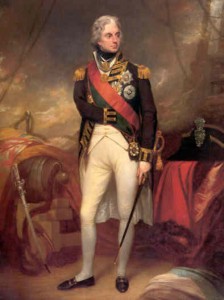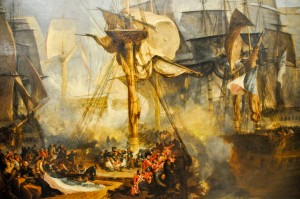 Lord Viscount Horatio Nelson lay conscious and dying deep below decks of the 104 gun Victory, naked under a sheet, shot through the spine and a lung, his chest massaged by his servant, Mr. Burke, in an effort to relieve him of some pain. Around him in the half-light wounded sailors and marines moaned and screamed. The Victory’s surgeon worked steadily in a scene that Nelson’s chaplain later described “…as like a butcher’s shambles (256).” * A ½ hour before he died Nelson said, “I feel something rising in my breast which tells me I am gone… He often exclaimed, ‘God be praised. I have done my duty.’ Upon the Surgeon’s inquiring whether his pain was still very great, he declared, ‘it continued so very severe that he wished he was dead. Yet’, [he] said in a lower voice, ‘one would like to live a little longer too (360-361).’” * His last words: “Thank God, I have done my duty (372).” *
Lord Viscount Horatio Nelson lay conscious and dying deep below decks of the 104 gun Victory, naked under a sheet, shot through the spine and a lung, his chest massaged by his servant, Mr. Burke, in an effort to relieve him of some pain. Around him in the half-light wounded sailors and marines moaned and screamed. The Victory’s surgeon worked steadily in a scene that Nelson’s chaplain later described “…as like a butcher’s shambles (256).” * A ½ hour before he died Nelson said, “I feel something rising in my breast which tells me I am gone… He often exclaimed, ‘God be praised. I have done my duty.’ Upon the Surgeon’s inquiring whether his pain was still very great, he declared, ‘it continued so very severe that he wished he was dead. Yet’, [he] said in a lower voice, ‘one would like to live a little longer too (360-361).’” * His last words: “Thank God, I have done my duty (372).” *
His body was carried home from Gibraltar bundled in a cask of wine. He was extravagantly mourned. His last words documented for the ages, honored above all other British war heroes (with the exception of Churchill), his statue rests 170 feet above Trafalgar Square in central London.
“Nearly seventeen thousand men from Britain” fought at Trafalgar, and “were drawn from nearly every town and county in the land…. (599)” * Most of their names have faded or were never recorded.
A part of this man’s life was noted: “On board the Belleisle Lt. Nicholas saw one seaman who had been shot in the head about to be dropped overboard. At the last moment he was found to be still breathing: ‘he was … saved, and after being a week in the hospital, the ball, which [had] entered the temple came out of his mouth (302).’” * His name has been lost.
And “Jeannette’, real name unknown, wife of an unknown French gunner, who leapt into the sea to escape the Achille’s terrible fire and was rescued by British sailors.
This is not an argument about whether Nelson deserved to be remembered above and beyond others at the time, but an observation about how often in history and literature the unnamed appear for an instant, are mentioned, and then vanish. You and I are almost certainly going to end up in the vast river of human beings who also dissolve into the tens of billions of others who once lived under the same sun and looked at the same blue sky. Shakespeare understood this … and something more.
In King Lear, in Act III, vii, a “first servant” draws his sword on his Lord, Cornwall, and commands him to stop his abuse of an old man, bound and bleeding: “Hold your hand, my lord: I have served you ever since I was a child, but better service have I never done you than now to bid you hold.” The servant dies, stabbed by Cornwall’s wife, Regan, his body “thrown upon the dunghill.” Two other unnamed servants step forward afterwards and make their own decisions:
Second Servant
I’ll never care what wickedness I do, if this man [Cornwall] come to good. … Let’s follow the old earl, and get the Bedlam (Edgar) to lead him where he would ….
Third Servant
Go thou: I’ll fetch some flax and whites of eggs to apply to his bleeding face. Now, heaven help him!
In the moment, the servants’ best natures come forward. They disobey Cornwall and Regan. They assert a profound moral value –they oppose cruelty. They assist the victim even though he is the professed enemy of their master.
Their names do not matter. Their actions do. Ultimately, so it is with us all I think. Graveyards are filled with the forgotten, but their lives still meant something. Before he died Hemingway’s character Robert Jordan thought, “Each one does what he can.” **
The sun revolves in the sky, the same blue sky that has met all of us. The irretrievable days go down, and “one would like to live a little longer ….,” but as I approach 60 years of age what seems most important are the actions for which I alone am responsible. What I have done this new day, and any day to come, whether remembered or lost, is all that counts.
* Nelson’s Trafalgar: The Battle That Changed The World, by Roy Adkins
** For Whom The Bell Tolls by Ernest Hemingway